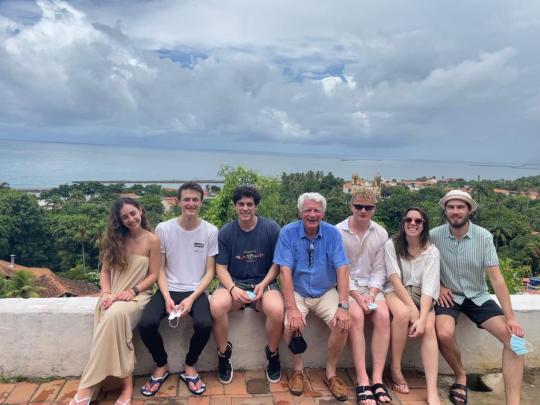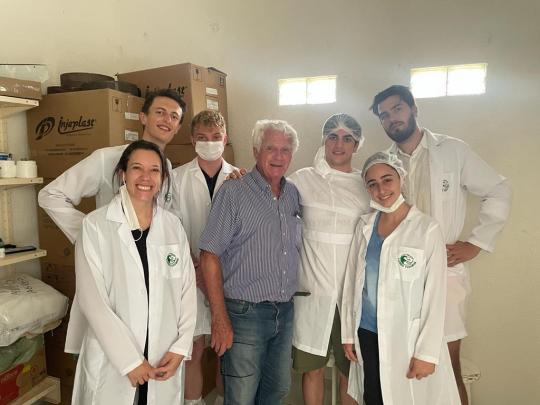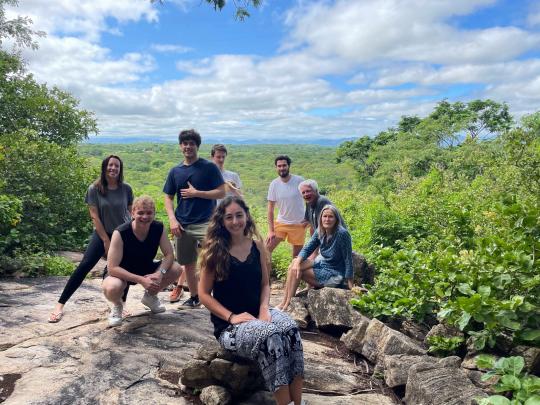
During the week of the 4th and 8th of April, a group of master's students of CATÓLICA-LISBON had the opportunity to visit Fazenda Tamanduá, a pioneer farm in the organic sector, and biodynamic agriculture, located in the northeastern region of Brazil. The visit is part of the school's initiatives to expand the importance of Sustainability in its scope of work and was a prize won by the students during the SDG Week, promoted by the Center for Responsible Business & Leadership in September 2021. The SDG week-long event, which aimed to promote knowledge and engagement around the Sustainable Development Goals and their importance for the private sector, ended with a challenge to the students in which they should design a business model to solve an SDG-associated challenge. A jury, that counted with the special participation of the Group Ageas Portugal, who sponsored the week, was responsible for selecting the champion group, which, at the invitation of Dr. Pierre Landolt, had the opportunity to travel to Brazil to get to experience, in practice, different sustainable projects that are positively contributing to the socio-economic and environmental development of the region.
Pierre Landolt is the co-owner of the Fazenda and is a former member of the Novartis Board for more than 20 years and Syngenta for 12 years, and who, since 1977, has practiced an innovative model of sustainable agriculture in Brazil, anticipating many of the sustainable agriculture trends of the current era.
The group, composed of students between 22 and 26 and a researcher from the Center, included a great diversity: a Brazilian, a Belgian, a Canadian, a Lebanese, and two Germans. A generation from different contexts and cultures with a great interest in common: to understand more about the sustainable practices and processes and how to use these principles as a competitive advantage to make a business reference in its sector.
During the five days the group spent at the farm, the students had the chance to deepen their knowledge and skills through different projects, covering the three pillars of sustainability: social, economic, environmental, and a fourth one Pierre refers to as the “cultural” one.
The group had the chance to meet different aspects of the farm, starting with a great explanation of its biodynamic principles - a holistic approach that relies on the full integration of the animals within the environment -, its history, and the adaptation processes it faces to deal with the challenges of the very specific weather of the region.

The group also had the chance to learn about honey production and bees; got to see the production of organic spirulina, visited the mango plantations, and went horseback riding to see more of the farm's vastness. The program organized by Pierre also included other visits outside the farm. The group had the opportunity to visit a construction materials recycling plant, discuss its business model and financial mechanisms and understand that the main challenge it faces is the lack of awareness when it comes to garbage disposables. They also visited a sustainable gold mining mine and discuss the importance of using specific types of practices that avoid the contamination of the soil and the re-use of water within the whole process.
The group also went to the city of Patos to get to visit Instituto Estrela, a microloan institute founded 17 years ago by Pierre and has, ever since, highly contributed to the socio-economic development of the region. The institute, which had already supported 54.000 clients, works with a unique methodology of “groups”, meaning the loans are always provided for a group of entrepreneurs that get together to support each other. Today, 65% of the institute's clients are women, who, through microcredit, have the possibility of earning their living and achieving financial independence. During the visit, the students got the chance to meet some of these clients and see in practice the type of businesses Estrela is supporting. The visit was a highlight for the students. According to Zachariah, "the time I spent at Fazenda Tamanduá was one of the most enriching and unique experiences I have ever had. Although all the activities were super interesting in their own ways, my favorite would have to be the time spent visiting the clients of Estrella”.
On the last day, the students got the unique opportunity to learn about a practical case of SDG 17, regarding the importance of building partnerships. Fazenda Tamanduá has a close relationship with the environmental protection agencies of the region, which had already released countless animals back to their natural habitat within the farm's perimeter.
Pierre Landolt is also currently working with the Environmental Federal Policy and the veterinarian course of UNIFIP, Centro Universitário de Pato (Patos' university) to create a new treatment center for rescue animals at the farm. The initiative arises from the need to create, in the interior of Paraíba, a first aid center for wild animals rescued in this region. Today, animals that are under the care of the Police must be sent to the state capital, several km away, which causes enormous inconvenience, involves a series of costs, and is a highly ineffective process for all involved. The objective of the partnership is to promote the training of everyone involved in the rescue of these animals and the creation of a triage center at Fazenda Tamanduá where the animals can receive care provided by the students of the Veterinary course. The animals, after the appropriate period, will be reintroduced into nature. It is a "closed-loop" process, which, through mutual support, allows the development of all partners, essential in the challenge of keeping the local fauna protected.
Northeastern Brazil is a region rich in culture and history. The visit was a unique opportunity for the students to learn more about a different culture, with many particularities, discover new foods and new rhythms, such as the famous “forró”.
According to Maxime, one of the participants, "the people at the farm are truly friendly and passionate. Even though we couldn't speak their language, their smiles and enthusiasm went beyond any words! I will cherish these memories always and really hope that I can come back to the farm one day"
In the words of another student, Max, “the week we spent at Fazenda Tamanduá gave us an inspiring and impressive insight into the sustainability of biodynamic agriculture. In addition, we got a first-hand look at the Estrela Institute of microcredit and its incredible impact on the socio-economic realities of many of the people where it works. This trip was a great source of inspiration for my research in the area of sustainable development.”
Providing students with “real life” examples is absolutely critical in Education, especially when it comes to environmental challenges. That is what this experience aimed to achieved. We are deeply grateful to Pierre Landolt and Fazenda Tamanduá to make this possible!

Have a great and impactful week!
Natália Cantarino
Researcher
Center for Responsible Business & Leadership
This article refers to edition #134 of the "Have a Great and Impactful Week" Newsletter and covers SDGs 2, 12 and 17.
Subscribe here to receive the weekly newsletter!